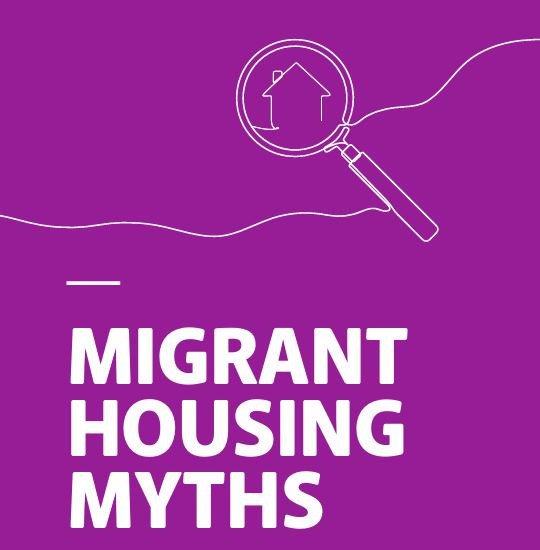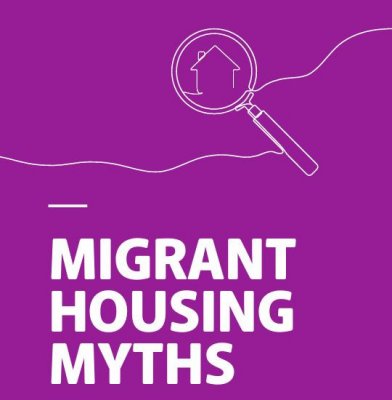
News

The information in this article was developed by the Northern Ireland Housing Executive Community Involvement and Cohesion Unit, in partnership with the Central Housing Forum. The Central Housing Forum is a panel of tenant and community representatives who work to co-design and shape housing services and is part of the wider Housing Community Network.
Understanding Key Terms
To begin, let's clarify some important definitions:
Migrant Worker: Someone who comes to the UK from abroad to work, often intending to return to their home country after a set period.
Asylum Seeker: A person who has left their country due to persecution, war, or violence, seeking protection in another country.
Refugee: An asylum seeker who has been officially granted asylum, legally recognizing them as a refugee.
Immigrant: A person who comes to live permanently in a foreign country.
Ethnic Communities: A social group defined by common ties of race, language, nationality, or culture within a larger society.
Common Myths and the Truths Behind Them
Here, we address some of the most persistent myths:
Myth 1: Illegal migrants, migrant workers, asylum seekers, and refugees are automatically entitled to social housing.
Truth: Not everyone from abroad is automatically eligible for social housing. Strict legislative rules define who can be considered for the Social Housing Waiting List, based on immigration status and habitual residence. Eligibility criteria differ for individuals from the European Economic Area (EEA), the UK, and other countries. Many migrants do not, in fact, seek social housing.
Myth 2: Asylum seekers get a free house and move to the front of the queue.
Truth: Housing for asylum seekers is the responsibility of the Home Office, not local Housing Executive or Housing Association properties. Asylum seekers are not eligible for social housing. They don't have access to the mainstream benefit system but receive a parallel welfare support system, including accommodation if they're destitute, while their asylum application is being assessed. As of March 2023, 3,030 people were receiving asylum support in Northern Ireland. If an asylum seeker is granted 'leave to remain,' they may then become eligible for social housing, assessed like all other applicants through the Housing Selection Scheme.
Myth 3: New migrant workers, asylum seekers, and refugees are "jumping the queue" for Housing Executive homes.
Truth: The Common Selection Scheme for social housing is entirely points-based and does not award points based on nationality, ethnicity, or religion. All applicants complete the same form, and individual needs are assessed using the published points-based system. Eligible applicants are placed on the Common Waiting List and allocated properties based on their needs and choices, according to the scheme's rules.
Myth 4: The Housing Executive decides where migrant workers can live.
Truth: When eligible for social housing, migrant workers are assessed under the fair and open Housing Selection Scheme, which allows applicants to choose their preferred areas. The Housing Executive awards points and places applicants on the waiting list for their selected areas of choice.
Myth 5: Asylum Seekers and Refugees are the same.
Truth: An asylum seeker is an individual seeking asylum, applying for refugee status based on persecution in their home country. Only if an asylum seeker's application is granted do they become a refugee, receiving temporary or permanent leave to remain. At this point, they may become eligible for social housing, subject to the usual application and assessment process.
Understanding Homelessness
Myth 6: Homeless people only live on the street.
Truth: Homelessness has a much broader meaning. A person can be legally classified as homeless if they are sleeping on a friend's sofa, staying in a hostel, living in an overcrowded home, or residing in poor housing conditions.
Myth 7: Housing Executive accommodation will be available immediately if you’re homeless.
Truth: The level of help provided depends on individual circumstances. If assessed as homeless, eligible for help, in priority need, and unintentionally homeless, the Housing Executive has a duty to find somewhere to live. This often involves providing temporary accommodation until a permanent housing allocation can be made, as defined by homelessness and housing law.
Understanding the facts about social housing eligibility and allocation is crucial for dispelling harmful myths. At Ark Housing, we are committed to transparent and fair processes for all applicants, ensuring that housing support is allocated based on established criteria and individual need, not on nationality or origin. We hope this information clarifies common misconceptions and promotes a better understanding of how social housing works for everyone in our community.
KEY CONTACTS
There are key organisations who can provide information and advice on Housing related matters. This includes the following organisations:
Northern Ireland Housing Executive (NIHE) Telephone: 03448 920 900 Email: information@nihe.gov.uk Address:
Advice NI The Housing Centre, 2 Adelaide Street, Belfast, BT2 8PB Freephone: 0800 915 4604 Email: advice@adviceni.net Address: Website: Advice NI, Forest View, Purdys Lane, Newtownbreda, Belfast, BT8 7AR www.adviceni.net
Housing Rights Telephone: 028 9024 5640 Email www.housingrights.org.uk/contact-us Website: www.housingrights.org.uk/contact-us/ get-advice 13 Additional contact details for support organisations who can provide advice.
Migrant Centre NI Telephone: 0330 088 0464 E-mail: admin@migrantcentreni.org Website: www.migrantcentreni.org/
African and Caribbean Support Organisation NI Telephone: 028 9043 4090 Email: admin@acsoni.org Address: Website: 9 Lower Crescent, Belfast, BT7 1NR www.acsoni.org
North West Migrants Forum Telephone: 028 71362184 or 07912295771 E-mail: info@nwmf.org.uk, Address: Website: 3rd Floor, Embassy Building, 3 Strand Road, Londonderry, Northern Ireland, BT48 7BH nwmf.org.uk
NI Direct - Asylum seekers and refugees: help and advice www.nidirect.gov.uk/articles/asylum-seekers-and-refugees-help and-advice